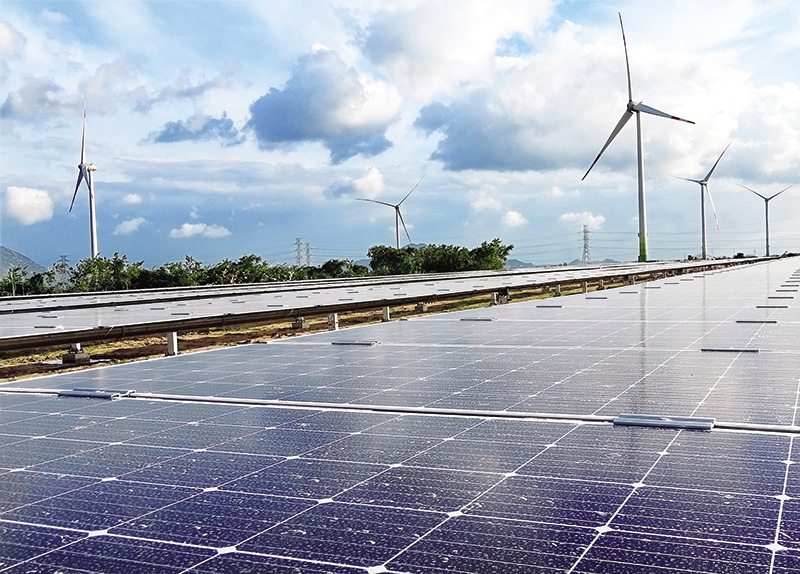Greener outlook in energy funding
 |
| The relatively young energy sector in Vietnam requires better industry know-how, Photo: Le Toan |
In the past three years, solar energy has become the new darling of Vietnam’s financiers. Spurred by supportive government regulations, banks are noticeably more eager to lend and investors are looking at the segment with rosy eyes.
“Through the government’s open-door policy, the private sector is now investing more in renewable energy, adding to their main business lines,” said Hoang Phuong, an investment representative at Vietnam Technological and Commercial Joint Stock Bank.
The list of banks with a green financing programme is getting longer. Orient Commercial Joint Stock Bank recently partnered with TTC Energy to supplement working capital financing for the energy firm’s solar energy system for leasing. Vietnam Joint Stock Commercial Bank for Industry and Trade also announced its plans to sponsor VND1 trillion ($43.47 million), equalling 62 per cent of the solar energy project TTC 01’s capital in the southern province of Tay Ninh.
In 2017, Vietnam Bank for Agriculture and Rural Development and Vietnam Development Bank also signed an agreement to underwrite 60 per cent of capital for Phong Dien solar energy plant in the central province of Thua Thien-Hue. Similarly, Saigon-Hanoi Bank offered loan packages for mid-sized renewable energy projects.
In addition to solar energy farm projects, many banks also signed deals with power firms to offer loan packages for end customers.
Bank for Investment and Development of Vietnam (BIDV) partnered with locally-invested SolarBK to provide solar energy packages for households with the limit of maximum loan at 75 per cent of the solar energy rooftop system’s capital and capacity of 2-10 kilowatt peak. Similarly, Ho Chi Minh Development Joint Stock Commercial Bank launched a loan package for the investors of solar energy rooftop projects with the cap of lending of VND10 billion ($434,800). HSBC Vietnam also offered existing clients a preferential lending programme, in collaboration with solar panel developer GIC Corporation.
Besides commercial banks, developers can now access capital from investment funds. For instance, with financial support from Dragon Capital, the Mui Ne Solar Energy Plant by Pacifico Energy Group officially began operations last month.
Moreover, Bamboo Capital Group’s VND1.09 trillion ($47.4 million) BCG-CME Long An 1 solar energy plant also received investment from Vietnam-Oman Investment and the State General Reserve Fund.
The financial sector’s embrace of green energy projects is seen as a move in a positive direction, both for the financiers themselves and solar energy developers. On one hand, banks in Vietnam can reduce their dependence on real estate lending, which has caused boom-and-bust cycles throughout the years. On the other hand, developers finally gain access to funding they need to expand solar projects, something they have been struggling to do due to lack of regulations and the banks’ unfamiliarity with green energy.
However, John Rockhold, country director of Energy Capital Vietnam, highlighted difficulties in getting bank loans for solar energy projects in Vietnam. “We hope the government gives more priority towards renewable energy, especially the incentives of switching from coal to gas energy and making the energy sector more bankable,” Rockhold told VIR.
Although the solar lending trend is just at the early stage of development, industry experts have already warned of possible risks. One particular area of concern is that commercial banks, and in many cases investment funds, are new to the sector and may find it difficult to judge the creditworthiness of each project.
Echoing this view, Le Kien Nghi, deputy manager at the Large Corporate Clients Department of BIDV, said that solar finance is challenging due to its long-term nature and lack of experience in this segment.
Tran Viet Ngai, president of the Vietnam Energy Association, emphasised that some Vietnamese solar energy firms have shown signs of blindly following trends. The herd mentality, without thorough preparation and professional help, may ruin these developers and consequently, make banks recoil from green lending.
“Firms are rushing to set up solar projects without fully understanding the technical or financial requirements of this very particular sector. Solar energy is highly dependent on the weather and also on the firm’s ability to sign with Electricity of Vietnam, the sole buyer of electricity in Vietnam” said Ngai.
According to industry experts it will take time, money, and effort for Vietnamese-based financiers to fully understand this new segment. Recommendations include working with agencies such as the International Finance Corporation, World Bank, and other global development lenders who can offer expertise and funding for young businesses. More supportive laws, from tax cuts to higher feed-in tariffs and industry benchmarks, may also be necessary.
What the stars mean:
★ Poor ★ ★ Promising ★★★ Good ★★★★ Very good ★★★★★ Exceptional
 Tag:
Tag:
Related Contents
Latest News
More News
- Trung Nam-Sideros River consortium wins bid for LNG venture (January 30, 2026 | 11:16)
- Vietnam moves towards market-based fuel management with E10 rollout (January 30, 2026 | 11:10)
- Envision Energy, REE Group partner on 128MW wind projects (January 30, 2026 | 10:58)
- Vingroup consults on carbon credits for electric vehicle charging network (January 28, 2026 | 11:04)
- Bac Ai Pumped Storage Hydropower Plant to enter peak construction phase (January 27, 2026 | 08:00)
- ASEAN could scale up sustainable aviation fuel by 2050 (January 24, 2026 | 10:19)
- 64,000 hectares of sea allocated for offshore wind surveys (January 22, 2026 | 20:23)
- EVN secures financing for Quang Trach II LNG power plant (January 17, 2026 | 15:55)
- PC1 teams up with DENZAI on regional wind projects (January 16, 2026 | 21:18)
- Innovation and ESG practices drive green transition in the digital era (January 16, 2026 | 16:51)






















 Mobile Version
Mobile Version